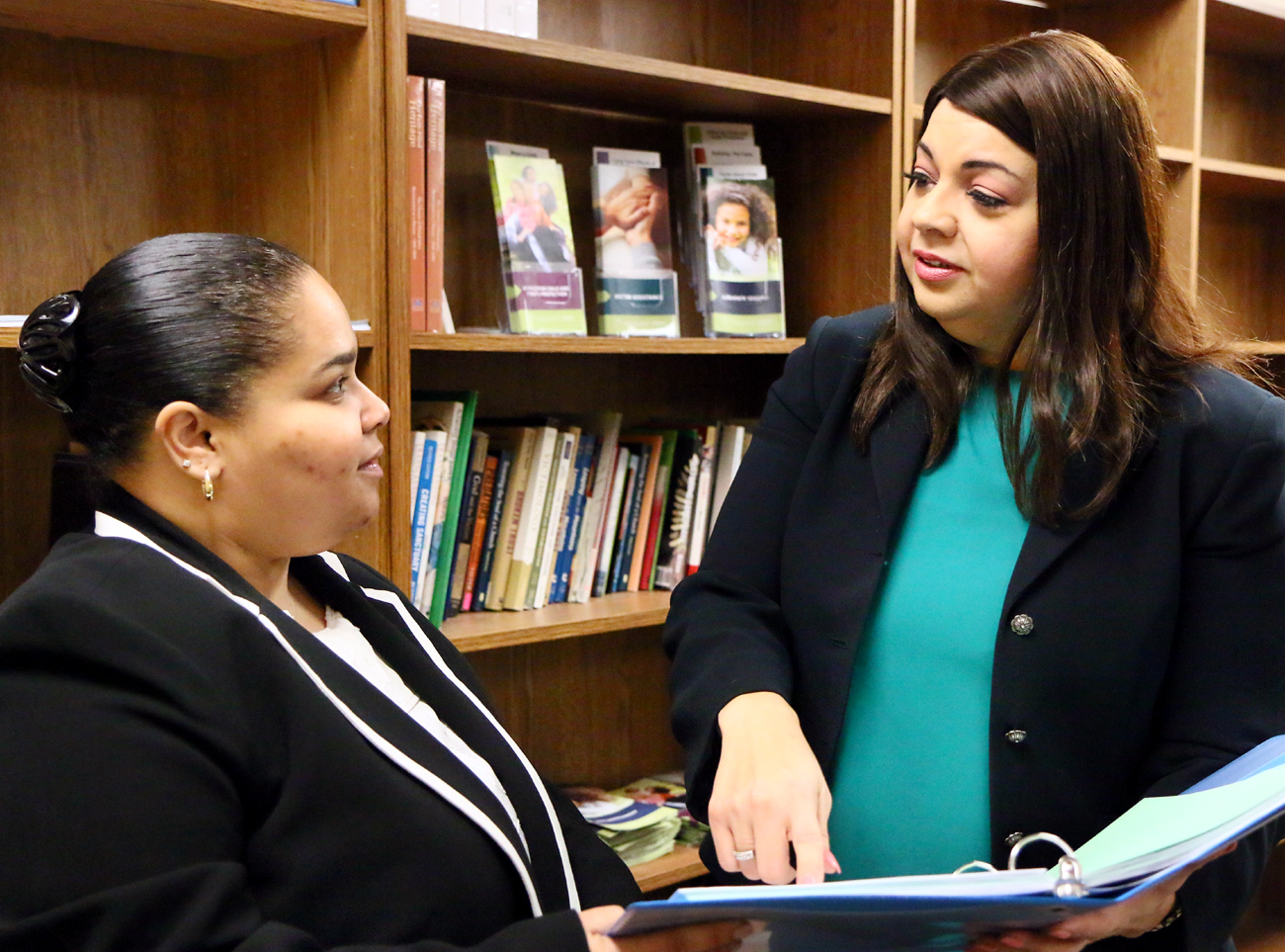
Leslie Davila (right), director of the Archdiocese of Philadelphia’s Office for Child and Youth Protection (OCYP), speaks with victim assistance coordinator Judy Cruz-Ransom in this February 2019 photo. OCYP will present three August webinars to address a surge in domestic and teen dating violence. (Photo by Sarah Webb)
With domestic violence soaring under COVID-19 restrictions, the Philadelphia Archdiocese will offer three upcoming webinars to tackle what many have called a pandemic within a pandemic.
The free sessions, which will take place on Aug. 4, 11 and 18, are being hosted by the archdiocesan Office for Child and Youth Protection (OCYP) and co-sponsor Congreso de Latinos Unidos, a Philadelphia-based non-profit that broadly supports the area’s Latino communities.
Presenter Stacey Padilla, a youth services and community education coordinator with Congreso, will survey the dynamics of domestic violence and its effects on children, as well as the issue of teen dating violence, which has risen in recent years. The webinars will also provide strategies and resources for assistance.
The wounds of domestic abuse run deep, said OCYP director Leslie Davila.
“Violence that happens anywhere in the family can have a lasting impact,” she said, with the physical, mental and emotional health of victims and their children all placed at long-term risk.
[hotblock]
Stay-at-home orders to mitigate the spread of coronavirus have led to “a horrifying global surge in domestic violence,” said United Nations (UN) secretary-general Antonio Guterres, who in April called for a “ceasefire” in such attacks.
The United Nations recently reported that some 243 million women and girls ages 15-49 have been subjected to sexual or physical violence by a partner in the last 12 months. Less than 40% of the victims report the abuse or seek any kind of help.
Pope Francis has repeatedly denounced domestic violence, which disproportionately affects females. In January, the pope declared that “every violence inflicted on women is a profanation of God, born of a woman,” and renewed his prayers for victims April 13, as pandemic lockdowns continued to exacerbate the issue.
Despite the gradual lifting of COVID restrictions, “domestic violence incidents continue to happen at higher levels,” said Davila.
“Abusers have taken advantage of the current situation to withhold or control necessary items such as hand sanitizers and masks,” she said.
[tower]
Leaving an unsafe home environment isn’t always an option, she added.
Travel remains limited, and although support agencies have remained in operation, “it may be difficult for a victim to reach out if they are continually watched,” said Davila.
“Abusers have had the opportunity to get a vice-grip hold on those that they are abusing, which is making it harder for victims to … get help,” she said.
Among teens, dating violence has become common. According to the Centers for Disease Control, nearly one in 11 females experienced physical dating violence, and one in nine sexual dating violence, in the last year. Some one in 15 male high school students said they had been subjected to physical dating violence, and one in 36 to sexual dating violence, over the same period.
However, stigma and fear of abandonment can prevent teens from seeking help — as does a lack of awareness that they are being abused.
“Teens often don’t recognize abusive behaviors,” Davila noted. “They don’t yet understand that repeated texts and messages asking where they are and telling them they can’t go out with friends isn’t just ‘care and concern.”
Modern reliance on cell and internet communications, which has intensified due to COVID-19, means that both teens and adults “are never fully out of the reach of their abuser,” Davila said.
“It’s not as simple as turning off your phone when the phone is our main source of keeping connected to family, getting help and staying informed, especially during these challenging times,” she said.
Teens are also less likely to identify physical violence by a dating partner as a source of concern, Davila pointed out.
“They may not understand that being grabbed, pushed, smacked or punched isn’t just someone ‘losing control because they love and care for them so much,’” she said.
Davila added that education is essential in preventing domestic and teen dating violence. Amid the pandemic, her office has moved in-person trainings online, while launching social media awareness campaigns. As part of OCYP’s Safe Environment lessons, a “Teen Talk” curriculum specifically addresses dating violence.
Offering the upcoming webinars to the wider community is part of OCYP’s broad commitment to upholding human dignity, said Davila.
“Our mission is our promise to protect all children, not just those in our parishes and schools,” she said.
***
Click here for more information on the Office for Child and Youth Protection’s domestic violence webinar series.
PREVIOUS: Doubleheader on home field for Archbishop Perez
NEXT: Outreach keeping babies, kids clothed amid COVID crunch



Share this story